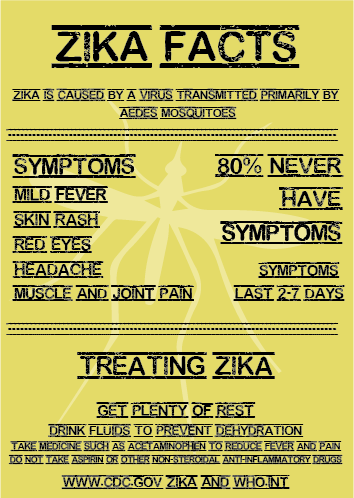Florida health officials announced on Sept. 13, that six additional cases of the Zika virus were transmitted locally, which brings Florida to a total of 70 cases.
According to the Center for Disease Control and Prevention (CDC), two regions of Miami, Florida, have identified cases of the Zika virus. The virus has been found in both Miami-Dade County and the Wynwood neighborhood. According to Florida’s Department of Health, more than 6,800 people have been tested for the virus.
According to the CDC, Zika can cause birth defects such as microcephaly and Guillain-Barré syndrome when pregnant women are infected.
According to Miami resident Yvette Alvarez, the mayor and local authorities are taking the necessary precautions to ensure the safety of all residents.
“Planes fly above South Beach with signs that say ‘insect repellent and no Zika,'” Alvarez said. “I have seen several warnings informing the public to stay away from areas where Zika has been found. Even Disney is taking precautions for its guests. Disney has mosquito repellent stations and also supplies repellent in each resort hotel room. I think the mayor and authorities are doing everything they can.”
According to the Florida Health Department, the 15 locally transmitted cases are few compared to the population of Miami residents, which is 12.7 million.
Florida is not the only place with known cases of the virus. Many countries outside of the United States have reported thousands of cases. According to the CDC, Guatemala has moved to the second of three travel warning levels because of the spread of Zika.
Senior Alicia Hovater traveled to Montellano, Guatemala, to complete medical mission work with Health Talents International.
“We, as a team, took care of 80 surgeries that ranged from plastic to general surgeries,” Hovater said. “I did not treat anyone with the Zika virus, however I was warned of the risks and symptoms associated with the virus. The virus symptoms are commonly confused with the flu. Unfortunately, at this time there is no vaccine.”
Students who travel abroad for mission work are not the only ones who need to take precautions. Senior Manuel Barrantes is from Managua, Nicaragua, which is at an alert level two, according to the CDC.
“There has been reported cases of the Zika virus in my hometown,” Barrantes said. “All travelers going to endemic areas are at risk. “
The CDC encourages anyone who has recently traveled outside of the United States or to South Florida to consider being tested for the Zika virus. Women who are pregnant or may become pregnant should also consider being tested.
